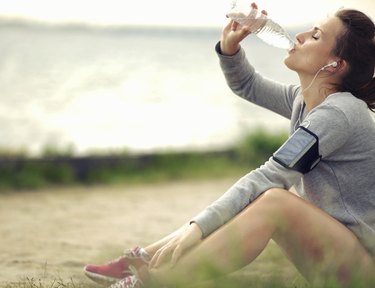
Hard workouts can result in muscles holding water or muscles that are depleted and dehydrated. These occurrences depend on pre-exercise hydration, type and duration of exercise and electrolyte levels. Water is a necessary component of rebuilding muscles and stabilizing the body after a workout. The body stores water in the muscles and cells as part of the recovery process.
Carbohydrates and Water Retention
Video of the Day
High-carbohydrate diets increase the amount of water the body stores. Carbohydrates break down to glucose and are used for energy or stored for future use as glycogen. One glycogen molecule is attached to 2.7 grams of water. Storing these molecules is necessary as muscles rebuild and recover from a hard workout. Carbohydrate drinks, such as Gatorade consumed during and after a workout, contribute to water retention in the muscles. Increasing the amount of carbohydrates in a drink decreases the rate of gastric emptying and causes a slower movement of fluids throughout the body. Individuals with higher levels of muscle glycogen will experience a small increase in total body water.
Video of the Day
Trained Muscles versus Non-trained Muscles
Trained muscles hold more water than non-trained muscles in order to improve performance. Water retention in the muscles maintains proper hydration and electrolyte levels throughout the body. With each hard workout, the muscles' ability to store more water and glycogen increases. Trained muscles store up to 135 mmol of glycogen and water per kilogram of body weight compared to non-trained muscles that only store about 80 mmol of glycogen and water per kilogram of body weight.
Hydration Levels
Hard workouts often lead to a loss of electrolytes and water through heavy sweating, leading to a decrease in total body water. The amount of water stored in muscles depends on individual sweating rate, type of exercise and duration, and amount and type of fluid consumed during exercise. The availability of electrolytes influences how much water is stored in the muscles, as muscles need sodium and other electrolytes to absorb water.
Water Weight
The amount of water stored in the muscles depends on the difference between water gain and water loss. Water gain happens through food and liquid consumption and metabolic processes. Water losses occur from respiration, sweating and gastrointestinal and kidney functions. Ideal total body water ranges from 45 to 75 percent of total body weight. The range is due the difference of water weight in body composition. Muscle tissue is about 70 to 80 percent water, while fat tissue is about 10 percent water. A hard workout increases the metabolism, often resulting in a small increase in total body water.
- American College of Sports Medicine: Exercise and Fluid Replacement
- American Council on Exercise: Why do I Seem to gain weight when I start to train for an endurance race like a half marathon?
- American Council on Exercise: Healthy Hydration
- American Council on Exercise: Electrolytes: Understanding Replacement Options